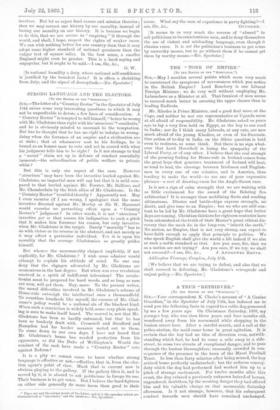STRONG LANGUAGE AND THE ELECTORS. [To THE EDITOR OY THE
" STECTATOR."] Sin,—The letter of a "Country Rector" in the Spectator of July 15th raises some very interesting questions to which it may not be unprofitable to devote a few lines of consideration. A "Country Rector "is tempted to tell himself, "better be wrong with Mr. Gladstone than right with his 'atrocious' * assailants," and he is obviously minded to succumb to the temptation. But has he thought that he has no right to indulge in wrong- doing when the fortunes of an empire and a civilisation are at stake ; that at whatsoever cost to his feelings, he is bound as an honest man to vote and act in accord with what his judgment tells him to be right P Is it not strange to find a " moral " claim set up in defence of conduct essentially immoral,—the subordination of public welfare to private whim P But this is only one aspect of the case. However "atrocious" may have been the invective hurled against Mr. Gladstone, no impartial man will say but that it is mild com- pared to that hurled against Mr. Forster, Mr. Balfour, and Mr. Chamberlain by the Irish allies of Mr. Gladstone. Is the "Country Rector "troubled thereby P Apparently not. May I even surmise (if I am wrong, I apologise) that the same invective directed against Mr. Morley or Sir W. Harcourt would exercise no perturbing effect upon a "Country Rector's" judgment P In other words, it is not "atrocious" invective per se that rouses his indignation to such a pitch that it makes him forswear his reason, but only invective when Mr. Gladstone is the target. Surely " morality " has to do with virtue or its reverse in the abstract, and not merely as it may affect a particular individual. Yet it is upon his morality that the average Gladstonian so greatly prides himself.
But whence the sacrosanctity claimed implicitly, if not explicitly, for Mr. Gladstone ? I wish some admirer would attempt to explain his attitude of mind. No one can deny that the choges advocated by Mr. Gladstone are momentous in the last degree. But when was ever revolution received in a spirit of indifferent toleration!' The revolu- tionist must be prepared for hard words, and so long as men are men, will get them. Nay, more. To the present writer, the moral difficulties involved in Mr. Gladstone's scheme of Home-rule outweigh the intellectual ones a thousandfold. To countless hundreds like myself, the success of Mr. Glad- stone's policy would be a national sin of the blackest kind. When such a conviction is widely held, some very plain speak- mg is sure to make itself heard. The marvel is, not that Mr. Gladstone has been so hardly entreated, but that be has been so tenderly dealt with. Cromwell and Strafford and Hampden had far harder measure meted out to them. To come down to our own days, I have not heard that Mr. Gladstone's house has needed protection from his opponents, as did the Duke of Wellington's. Would the conduct of the mob have made a "Country Rector" vote against Reform ?
It is a pity we cannot come to know whether strong language is effective or not,—effective, that is, from the elec- tion agent's point of view. Much that is current now is obvious playing to the gallery. If the gallery likes it, and is moved by it, it is absurd to ask politicians to forego its use. Their business is to get votes. But I believe the hard fighters on either side generally do more harm than good to their * These are not the actnal words of the letter, and it is the speeches which arc characterised as "atrocious," not the spealters.—En. Spectator. cause. What say the men of experience in party fighting ?—I [It seems to us very much the reverse of "absurd" to ask politicians to be conscientious men, and to deny themselves the use of violent and misleading language, even though it obtains votes. It is not the politician's business to get votes by unworthy means, but to go without them if he cannot get them by worthy means.—En. Spectator.]


































 Previous page
Previous page